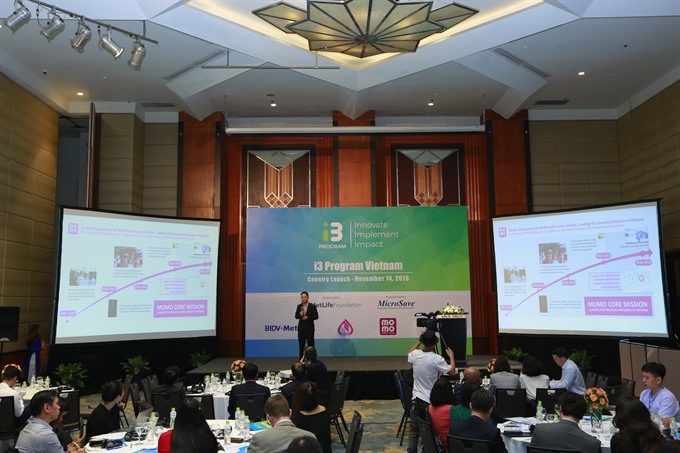Banking apps on cell phones are helping people in rural areas manage their finances. That was the message from Pham Xuan Hoe, deputy director general of the Banking Strategy Institute at the State Bank of Viet Nam (SBV).

Banking apps on cell phones are helping people in rural areas manage their finances, said Pham Xuan Hoe, deputy director general of the Banking Strategy Institute at the State Bank of Viet Nam (SBV) at the launching ceremony of the i3 programme held in Ha Noi on Wednesday.
The i3 programme launched by MicroSave, MetLife Foundation and Viet Nam Bank for Social Policies (VBSP), which stands for Innovate, Implement and Impact, aims to help these communities by supporting financial institutions that are developing their digital transformation initiatives on this particular segment. The programme is expected to impact around 400,000 low-and-middle income people.
“The SBV aims to leverage the accomplishments of the Fourth Industrial Revolution with regards to digitalising activities in the banking sector to create quick access to financial resources for the people and businesses,” Hoe said.
Experts said despite a low rate of access to formal financial institutions, the banking sector in Viet Nam has witnessed a revolution.
Viet Nam is projected to have the fastest growing retail banking market in Asia, with an expected compounded annual growth rate of 25 per cent from 2016 to 2018.
However, more than 90 per cent of payments remain cash-based because, he said, people still believe more in cash transactions.
“In order to change that habit, first of all it is necessary to give people greater confidence in new forms of payment, then to take into account the financial services,” he said.
He added that the application of financial technology has had a great impact, especially for low-income people. However, there are still many things to do.
Manoj Sharma, managing director, Asia, MicroSave said: “While basic access to banking services and products remains a challenge in Viet Nam, the Government has shown firm commitment through conducive policies that aim to advance financial inclusion.
“Through the i3 programme, MicroSave aims to work with strong and capable financial services and fintech institutions to design and deliver financial products and services that meet the needs of low and moderate income people, who aspire to lead financially healthy lives.”
Gaurav Sharma, CEO and general director, BIDV MetLife Life Insurance LLC said: “Viet Nam is undergoing a historic and exciting growth phase, making this the right time and perfect opportunity to ensure the growth is inclusive and equitable. MetLife Foundation is very well aligned with the Vietnamese Government’s priority of improving financial health of low- to moderate-income people, and the i3 programme is a great example of that. We hope to create a positive impact on the financial lives of two million people across Viet Nam with this initiative.”
“With the goal ’Not let the Fourth Industry Revolution ignore the poor’, through the co-operation with MicroSave at the i3 programme, we expect to raise digital financial literacy for the poor, help increase and improve access to the full range of digital financial services to those who lack access to traditional banking services, accelerating economic opportunities for low-income households and women-led microenterprises,” said Bui QuangVinh, VBSP’s Deputy General Director.
At the launching ceremony, Viet Nam Bank for Social Policies and MicroSave signed a memorandum of understanding for co-operation.
Under the MoU, the bank would continue implementing the second phase of the mobile banking service project designed to improve access to a full range of financial services for low-income households, especially women-led micro-enterprises that lack access to traditional banking services. The MicroSave would provide technical and consultancy supports worth US$50,000 to VBSP.
The project which was implemented in co-operation between VBSP, Mastercard and the Asian Foundation over three years sent account-related information via SMS texts to clients, thus improving transparency and reducing delinquency rates. — VNS





